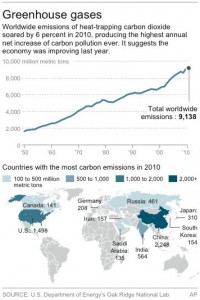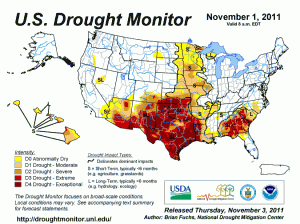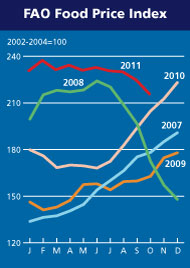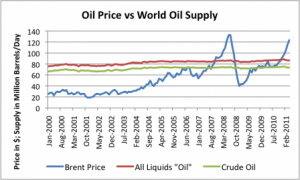The video embedded below, along with the draft script and supporting links, can be freely…
Global warming, population growth, and food supplies: When will Americans finally “get it”?
by Gary Peters
To borrow a line from Pete Seeger, “When will we ever learn?” If Karl Marx were alive today he would quickly see that television has become the opium of the people, dulling our senses and keeping our minds focused on trivial matters even as the world around us careens further out of control every day. What passes for national news media today is all corporate owned and dedicated to telling us as little as possible, placing virtually nothing in context, and talking to “experts” in thirty second sound bites. What they don’t tell us is often the stuff we really need to know.
My wife and I were having breakfast recently in a small local café. Near us two men were talking loudly enough to be overheard. Their conversation was focused on guns and the main theme was this: “Nobody is going to take my guns away.” One of them stated that he now had more than one thousand rounds of ammunition and was ready for anything. I still can’t imagine what he was getting ready for that would require a thousand rounds of ammunition, but at least in his own mind he was planning for the future as he perceived it. That is more than most Americans are doing! Our nation is suffering through a period of leadership failure that we can no longer ignore.
It may not be possible to predict the future, but we are going to get nowhere until most Americans realize that there are threats out there that we are not only not preparing for but our leaders are trying to keep us as ignorant as possible of. One of these is global warming, which is guaranteed to affect virtually all of us, not just in the United States but virtually everywhere. Even as many of our leaders, especially Republicans, remain in denial and assure us that all will be fine, scientists keep finding more supportive data all the time. Earth’s atmosphere is warming and humans are responsible, so we need to begin to think seriously about what we can do to slow the process and how we can adapt to changes that are coming our way. The ostrich approach that our nation has taken so far has not worked and will not work in the future.
The figure below, from the Oak Ridge National Lab, shows that in 2010 humans added more carbon dioxide to the atmosphere than in any previous year. Despite knowing and talking about global warming and greenhouse gases for two decades or more, it is clear that the world is not actually biting the bullet.
China and the United States are the world’s leading emitters of carbon emissions, followed by India, Russia, and Japan. We know that the more carbon dioxide we add to the atmosphere, the warmer it will get. Denial will not change that fact, but it helps put off confronting it. As astrophysicist Neil deGrasse Tyson said in an interview a while back, “Science is true, whether you believe it or not.” Powerful interest groups—including fossil fuel producers, mediocre media, and paid-off politicians—have managed so far in this country to keep Americans bewildered about global warming. The fossil fuel industry alone has backed all kinds of misleading stories, tried to confound the science behind global warming, and won the hearts and minds of many Americans by telling them that it is OK to continue business as usual. Hey, folks, it is just a hoax, as such “thoughtful” people as Oklahoma’s Senator Inhofe have told us repeatedly. I agree with Mark Hertsgaard, who wrote, in his book Hot: Living Through the Next Fifty Years on Earth:
Deniers have a right to express their opinions, but it should not be an unfettered right. The U.S. government prohibits tobacco companies from running cigarette ads on television—why shouldn’t it prohibit companies from running misleading ads about climate change? And if deniers wish to testify before Congress, lobby government agencies, appear in the media, or otherwise influence public policy and debate, their audiences should be reminded of their track record on the issue and the deniers should be forced to defend their unscientific ranting. We don’t allow tobacco companies to decide public health policies; we shouldn’t allow fossil fuel companies and their dupes to decide climate policy.
Earlier this year much of the U. S. Heartland roasted; serious to extreme drought conditions across much of the southern tier of our nation occurred and have continued, as shown in the figure below. Withered crops are already visible in many parts of Texas, Oklahoma, and other states; without rain future planting will be marginal at best. Nonetheless, the governor of Texas and now Republican presidential candidate Rick Perry doesn’t think the science of global warming is settled. He did ask Texas citizens to pray for rain, however, but so far that hasn’t helped. With another La Nina developing right now and likely to extend through winter, it doesn’t look good for Texas. It doesn’t look good for Governor Perry either, but that is another story.
Even as extreme drought covers much of Texas and its neighbors, over in Thailand people are still dealing with excessive rainfall that has flooded sizable parts of the nation, including parts of Bangkok. Both of these events, whether directly related to global warming or not, are examples of what climatologists tell us to expect in the future—more weather extremes, from floods to droughts. Devastating recent floods in Italy have gone virtually unmentioned in major American media.
Despite overwhelming evidence that our atmosphere is warming, that it now contains more moisture than it did a few decades ago, that extreme weather events are becoming more common, that glaciers are melting almost everywhere, and that sea level is rising, Americans and most others are doing little to “stockpile a thousand bullets,” i.e. to plan for what is coming our way and to try to slow the process.
We were officially warned in 1988, when Dr. James Hansen testified before Congress about the approaching dangers of pumping more and more carbon dioxide into the atmosphere. Since then, not only has evidence of global warming piled up, most of that evidence shows that it has already arrived and is proceeding faster than most earlier predictions imagined possible. The great heat wave that killed thousands of people in Europe in the summer of 2003 provided clear evidence that we were leaving the old, fairly stable, climate regime behind.
The longer Americans and others remain in denial, and the more carbon dioxide (along with methane and other greenhouse gases) that we pump into the atmosphere, the more difficult it will be for future generations to cope with Earth’s changing climate. The asteroid that recently zoomed by Earth missed us, thank goodness, but global warming will not. It is here, it is real, and we should be thinking hard and acting fast both to mitigate further warming and to adapt to the warming that is already built into the atmosphere.
I know that there are skeptics out there, but most have no scientific credentials. Among others, I’m sorry to see some who take peak oil seriously shrug off global warming, in part, I guess, because they believe oil will be used less in the future, so we’ll have less carbon dioxide going into the atmosphere. Though they could be right, we’ve already added enough carbon dioxide to the atmosphere to make sustained warming a reality, but we are not ready. Since the beginning of the Industrial Revolution the carbon dioxide content of the atmosphere has increased from 280 parts per million to 390 and it is still rising steadily; much of this is caused by humans and their burning of fossil fuels. In a recent essay on Energy Bulletin titled, “Peak oil: The Five most common misconceptions,” Robert Rapier, a chemical engineer, wrote the following:
So I think as far as peak oil goes, most of us can agree that just as it did in the U.S. in 1970, global oil production will inevitably decline. The points of contention are the timing, the steepness of the decline, the impact on the global economy, and the ability of other energy sources to fill the supply gap. Some believe it will be a non-event, and some people believe it will be catastrophic.
What do I believe? I think of peak oil as supply struggling to keep up with demand, which will keep prices at recession-inducing levels. I think that we will probably eek out a bit more global production, but I will be surprised if the world gets past 90 million barrels per day. I believe that shale gas and oil sands production will continue to rise, and global carbon emissions will continue their upward march.
His last sentence is absolutely correct and one more warning to us all. Whatever happens to oil extraction, when added to other fossil fuels, including coal and natural gas, we are assured that, unless we make positive attempts to curb them, carbon dioxide emissions will continue well into the future, guaranteeing our planet a measure of warming that humans will find hard to cope with. Hard is not impossible, but the time to act is now, not in 2050 or some other future date. We cannot wait until fossil fuels run out before we act.
The simple arithmetic of population growth, without massive changes in how we view humans and their purpose on Earth, assures that global warming, environmental degradation, famines, and other unacceptable threats to human life will continue. Like all animals, humans must have food and water to survive. Right now humanity experiences about 140 million births each year and about 60 million deaths, leaving us with a net gain of about 80 million people each year. Earth’s population has doubled since 1966. This year the human population reached seven billion; it reached 6 billion in 1999, only a dozen years ago.
One disconcerting trend in recent years has been toward high food prices, driven higher by a combination of weather problems, e.g. floods and droughts, population growth, greater affluence, agricultural subsidies in rich countries, and the growing use of crops, especially corn, to fuel vehicles rather than human bodies. The figure below is the latest from FAO; though prices in 2011 have trended a bit downward in recent months, overall prices remain very high.
According to the FAO’s Food Outlook, June 2011:
Halfway into this turbulent year and with new marketing seasons for major food crops commencing soon, this is a critical time to evaluate current developments in global food markets and to draw the early outlook for 2011/12. In a remarkable turn of events, earlier prospects for more comfortable supply situations and stable prices gave way to increasingly worrisome outlooks and to an escalation of international prices to levels not seen in decades. In fact, the FAO food price index in May stood at a ear historical high of 232 points, down only 6 points from the February record. While unfavourable weather was the main culprit, a host of other unpredictable factors negatively impacted stability in the food markets, including the catastrophe in Japan, an unprecedented wave of political unrests engulfing many countries in North Africa and the Near East, another strong increase in oil prices, prolonged uncertainty in financial markets and in the global economy.
Even as weather and other phenomena take their toll on agricultural production, still another variable lingers in the background. Modern agricultural production depends as never before on oil, yet even high oil prices have not recently brought forth large new supplies. The figure below is from a post by Gail Tverberg:
Will all this soon improve? Most modern economic theologians assure us that it will. Those two magic words, supply and demand, will wondrously bring food to the starving, cheap oil to the world, and that magic elixir, economic growth, shall pour forth again. Sadly, throughout the twentieth, and even into the twenty first centuries, a vast majority of people have believed this message, or at least tried to. Pushers, from Wall St. to the World Bank and IMF, tell the poor just to wait a little longer, do the right things, and all will be well. Even as toxic debt piles up in the cellars of banks around the world, the promise remains. Just wait and see!
In a recent post on her blog, Our Finite World, Gail Tverberg wrote:
People wonder what has been happening recently, with wildly gyrating financial markets and government debt problems. It seems to me that we are bumping up against an economic growth ceiling, brought on by a limited supply of cheap oil. As a result, we appear to be headed back into recession. Debt deleveraging can be expected to play an important role as well, and may cause this recession to be much worse than the last one.
Economists have always promised more than they could deliver, spreading the costs of growth around while concentrating the benefits in relatively few hands. If we look at a few other major trends in the world today it should be plain to people that we cannot continue on the path we’re on without experiencing more famines, further environmental degradation, and much harder lives for those already struggling most.
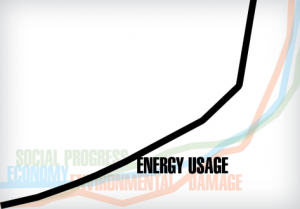
We could add some additional images to the above, including the following:
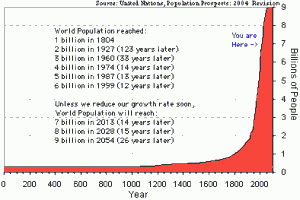
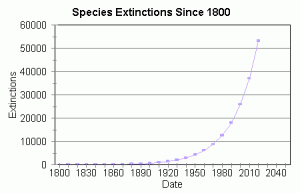
The most striking feature of all of the above graphs is their rapid upward trend. It shouldn’t take a nuclear physicist to point out that all of these trends are unsustainable on our only planet. As Kenneth Boulding wrote long ago, “Anyone who believes that exponential growth can go on forever in a finite world is either a madman or an economist.”
Unfortunately, there are far too many of both in the world today, arguing even now that the answer to unemployment problems in the U.S. and elsewhere in the struggling world economy is economic growth. Old paradigms don’t die easily.
In an excellent recent post on her blog, Gail Tverberg wrote:
The problem we have is that the world’s population has grown to 7 billion people. If we substantially cut back on oil (or on fossil fuels in general), there is a question as to whether w will have enough food and water to support the 7 billion people alive today. If we had very many fewer people, we would have much less of a problem.
I could not agree more. As we continue to add more than 200,000 people to the planet each day, I cannot think of a single problem that adding more people will help solve. To a considerable degree we’ve burned through precious fossil fuels as rapidly as possible to enrich a few and make life at least possible for billions more; the bottom billion or two are poor beyond anything most people could believe. Historians may look back on the twentieth century as the most wasteful in human history. Warnings were abundant—economic growth was eating up Earth’s resources at an accelerating rate and taking a horrendous toll on our only planetary home. The trends illustrated above, collectively, cannot continue without damaging our planet’s ability to support human life.
For most of us to stand by while our banks, fossil fuel industries, and other giant corporations buy up politicians and do everything they can to continue economic growth on our finite planet, no matter what the costs, is nearly criminal. If we do not raise our voices in favor of changing these trends now, future generations will see us as a generation that put greed and growth above morality.
In the introduction to A Short History of Nearly Everything Bill Bryson wrote that “Survival on Earth is a surprisingly tricky business…we come from a planet that is very good at promoting life but even better at extinguishing it.” Most Americans shrug off such warnings and instead embrace our prevailing cultural myths, especially those of progress and exceptionalism.
I wish every American could spend an hour or two strolling through the streets of Ephesus, a city in Turkey that today is empty and in ruins, a tourist attraction only. People have lived in the region around Ephesus for at least 8,000 years, though the city was founded by the Greeks only about 3,000 years ago, during the tenth century BCE. It was one of the twelve cities of the Ionian League during the Classical Greek era. Later Ephesus fell under Roman rule and by the first century BCE was the second largest city in the world, exceeded only by Rome.
What each American needs to absorb while walking those long-vacated streets of Ephesus is this: Nothing lasts forever. Nothing! Each would need to feel for himself or herself not just the depth of time and the human creations of those who lived in Ephesus but the fact that life there could not be sustained, no matter how glorious it had been in earlier times. As Bryson said, for all of us survival is tricky business; the same is true for all of what humans have created in their short sojourn on Earth.
In the Prologue to his imaginative book, The World Without Us, Alan Weisman wrote the following:
For a sense of how the world would go on without us, among other places we must look to the world before us. We’re not time travelers, and the fossil record is not complete, the future won’t perfectly mirror the past. We’ve ground some species so thoroughly into extinction that they, or their DNA, will likely never spring back. Since some things we’ve done are likely irrevocable, what would remain in our absence would not be the same planet had we never evolved in the first place.
Yet it might not be so different, either. Nature has been through worse losses before and refilled empty niches. And even today, there are still a few Earthly spots where all our senses can inhale a living memory of this Eden before we were here. Inevitably they invite us to wonder how nature might flourish if granted the chance.
It is not too late for us to act, but each year that we do nothing or remain in denial about the trends that are all around us we are guilty of putting ourselves above posterity. We are headed toward becoming ancestors that future generations will speak ill of, a generation who kept practicing business as usual in the face of overwhelming evidence that it would be disastrous for the planet, for humanity, and for the world’s various ecosystems.
_______________
Gary Peters is a retired geography professor who specialized in population geography. He has taught and written about population and related issues for four decades, during which time the world has added more than three billion people. He also taught economic and physical geography, which gives him a relatively broad perspective on what is going on in our world. Unlike most economists, Peters sees our planet as finite and incapable of sustaining any process that involves physical growth of anything.

